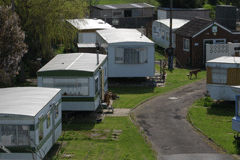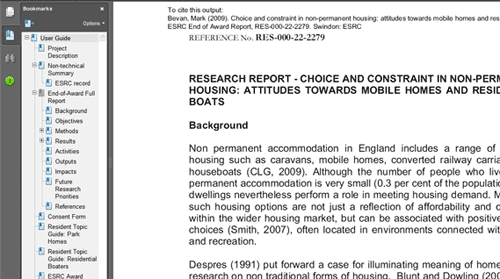Impact
Qualitative studies that deal with housing and local environment form an increasing selection of the collections at the UK Data Archive. These themes have traditionally been a core interest amongst many social scientists and they are therefore represented by both classic and contemporary studies. The former include research by Peter Townsend such as The Last Refuge and Dennis Marsden’s Mothers Alone: Poverty and the Fatherless Family which were conducted in the 1950s and 1960s. ESDS Qualidata successfully worked to digitise these materials and preserve them with the UK Data Archive. Research available through the data catalogue of a more contemporary kind includes collections such as Flood, Vulnerability and Resilience and Banking on Housing; Spending the Home. A further example is Choice and Constraint in Non-Permanent Housing which can be used as a case study of research into housing and local environment.
Researching attitudes to housing and local environment using a qualitative study
The research project conducted by Mark Bevan and archived as SN 6429 Choice and Constraint in Non-Permanent Housing: Attitudes towards Mobile Homes and Residential Boats, comprises a series of 59 semi-structured interviews with residents and other stakeholders. It examines in detail perceptions of the constraints and opportunities for people who live in mobile homes and on residential boats.
The motivation of respondents in choosing these types of accommodation was examined, as was the degree to which choice and constraint in the housing market played a part in their decision making process. The interviews also explored respondents’ aspirations regarding housing, as well as their perceptions of attitudes about their homes amongst the wider general population.
How could the data be used for research?
Use of this study for research into housing and issues of local environment would have value at the level of comparative research and for discussion as an exemplar of good methodology and research management. The catalogue record for the study also identifies a number of topics which are broached. These include; housing for the elderly; community behaviour and action; housing needs; quality of life; social attitudes and public opinion.

“there seems to be a certain type of person who moves on to a mobile home site. There are a few people who keep themselves to themselves, loners .. but then they’re just as entitled to do that as others are to be more sociable, and their, their wish to keep themselves to themselves is respected. .. You know they’re not thought of, they’re thought of just as highly as those who integrate more fully .. cos we have a social club .. which .. hosts regular events and also day trips by coach .. out to various parts of the country .. and that’s well supported. But .. yes, I would say I definitely feel part of a community.” int036 page 17
As can be seen from the quote above, the study is full of examples that could be useful to other researchers in describing the attributes, attitudes and behaviour of individuals and groups from the original project. Since the data is archived and available for sharing – as opposed to being lost or closed to other researchers – it can be used for comparative research or as a foundation for building related research projects.
Finding the data
The study SN 6429 Choice and Constraint in Non-Permanent Housing: Attitudes towards Mobile Homes and Residential Boats can be found through the Discover catalogue search engine searching under the principal investigator, the title or the study number.
The Data Catalogue record provides a comprehensive overview of the study, including abstract, sample information and methodological details.
User documentation for this study, including both a user guide in PDF and a data list in Excel, can be downloaded from the Data Catalogue record before an order for the actual data is placed.
Users can take advantage of the documentation to familiarise themselves further with the archived material. Study-related documentation can be accessed by either scrolling to the bottom of the catalogue record or by clicking on the documentation link at the top of the page.
In the data list file, users can have a closer look at key characteristics of the study participants, such as age, occupation, gender, race, date of interview, etc.
Users can also access a study-specific user guide which provides an insight into how the study was designed and then carried out. The content of the user guide varies from collection to collection since it relies on how much documentation has been deposited. In the case of this collection the guide is a 31 page document including the full end of award report, topic guides, copies of the project consent form and a list of key publications.

Reviewing the catalogue record and documentation will give data users a good overview of the material available as well as offering a picture of the context in which the study took place.
Other sources for similar data
There are a number of institutes and non-government organisations interested in issues of housing and the local environment including the Centre for Housing Policy at York University and the Young Foundation. Most prominently the Joseph Rowntree Foundation has ‘Place’ as one of its current four key areas of research – Place: Contributing to the building and development of strong, sustainable and inclusive communities. . Under this theme can be found research, statistics and publications on issues such as housing and neighbours, homelessness, and public places.
Downloading the data
This study’s original interview material can be easily accessed online and downloaded in RTF format. Data can be ordered by clicking on the ‘Download/Order’ tab in the catalogue record.
Publications related to the study
Bevan, M. (2007) Residential mobile homes in Scotland, Edinburgh: Scottish Government.
Bevan, M. (2009) ‘Planning for an ageing population in rural areas: the place of housing design’, Planning Practice and Research, 24(2), pp.233-250.
Bevan, M. (2009) Review of rural housing enablers, Edinburgh: Scottish Government.
Bevan, M. (2009) Park home living in England: prospects and policy implications, York: Centre for Housing Policy.
Bevan, M. (2010) ‘Retirement lifestyles in a niche housing market: park-home living in England’, Ageing and Society, 30(6), pp.965-985.
Satsangi, M., Gallent, N. and Bevan, M. (2010) The rural housing question: communities and planning in Britain’s countrysides, Bristol: The Policy Press.
